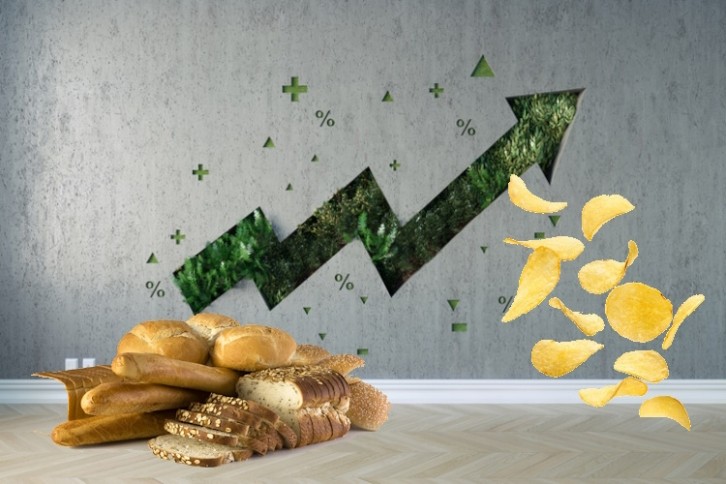The potential $1.5 billion EUDR cost to consumers

The EU Deforestation Regulation (EUDR) is the latest round of EU sustainability regulation that attempts to influence global regulatory policy and value-chain practices as part of the bloc’s effort to achieve key aims of The European Green Deal such as no net emissions of greenhouse gases by 2050.
The EUDR is arguably one of the most far reaching and impactful pieces of EU sustainability regulation, aiming to cut greenhouse gas emissions and limiting biodiversity loss by targeting those commodities linked to deforestation, such as palm oil, cocoa, coffee and soya, along with cattle, rubber and wood and their associated products.
The regulations come into force on December 30, 2024 for large companies (2025 for SME’s) and will require companies to prove their products are not linked to deforestation or forest degradation through, for example, the expansion of agricultural land.
All countries and industries wishing to trade within the EU will need to transition to a sustainable, deforestation-free supply chain and legal agricultural value chain and follow mandatory due diligence reporting.
The sting in the tail
As expected, compliance will incur upfront and ongoing costs.
There is much debate amongst economists and policymakers regarding the actual effect of all this sustainability regulation on the economy, with 56% of Europeans believing climate change policies are a source of economic growth.
The European Investment Bank predicts the various climate actions by the EU – including the European Green Deal, the New Circular Economy Action Plan and the Directive for Empowering Consumers for the Green Transition – will have a relatively small hit to EU-wide aggregate GDP at 0.4% below the baseline (worst-case scenario) by 2030.
The rationale behind such a relatively small hit to GDP is the belief that jobs lost through climate action will be replaced with jobs in sectors that will grow as a result of this same action.
However, a new study by GlobalData’s agribusiness consultants believes EUDR compliance costs could be high. In fact, the costs for those operating in the supply chain for oil palm products, their derivatives (crude palm oil and palm kernel oil) and rubber alone could be in excess of an eye-watering $1.5bn.
This figure is based on the implementation of systems to trace palm oil back to its plantation of origin (estimated between $100k to $1m, based on company size), along with certification costs for standards like RSPO (Roundtable on Sustainable Palm Oil) ($50k to $300k) and legal support to implement EUDR requirements and maintain compliance records ($20k to $150k). There’s also the potential increase in sustainable raw material costs by 15%-25%.
According to industry sources, EU companies importing EUDR-compliant oil palm products and their derivatives could face premiums of between $300-$600 per ton for palm kernel oil and $50-$100 per ton for palm oil, while those importing EUDR-compliant cocoa beans could see premiums of around $20-$30 per ton.
Greenflation and the consumer
While the burden will obviously be felt by the companies and manufacturers – and many will be able to absorb some of the costs themselves – there is a fear these premiums could be passed on to EU consumers.
It’s highly likely European consumers will experience some degree of ‘greenlation’ as compliance costs will be at least partly passed on in some form, be it through price increases, value engineering through reformulation (a drop in cocoa content, for example) or product size (the so-called shrinkflation: a reduction in size but not the price).
Palm oil is a highly versatile, thanks to its neutral taste, stability at high temperatures and long shelf life, and widely used by the food industry. It’s found in a raft of products, from snacks and baked goods to breakfast cereals, chocolate, ice cream and processed foods. All have the potential of being impacted.
“The gap between big and small companies could get wider as larger companies are more able to shoulder the additional regulatory burden,” said Fred Diamond, senior F&B consultant and analyst for the market researcher.
“The exact impact on consumers will depend on a variety of factors, including how companies choose to respond to the regulation, the extent to which the regulation is enforced and how much assistance EU member states are willing to give to supplier countries to help them align with the new rules.”
He noted the extra demands of the EUDR could lead some commodity suppliers in what the EU terms ‘third countries’ to focus elsewhere, such as China, which imposes fewer regulatory requirements.
There’s likely to also be increased friction between EU states and ‘producer countries’ outside the EU. Smallholder farmers will undoubtedly feel the sting of additional costs and governments in countries in West Africa (cocoa farmers) and South-East Asia (coffee farmers) have already had to step in to support them.
However, the costs of not acting would be greater, especially with reports confirming that the world’s top climate scientists expect global heating to go well beyond the current 1.5C target.
“Sustainability regulation associated with cutting greenhouse gas emissions remains an urgent priority for the planet,” said Diamond.
It’s time to act
EU Sustainability Regulations: How the EUDR and other Sustainability Regulations will impact consumer markets explores some of the EUs key sustainability regulations, with specific focus on the EUDR, its challenges for farmers and companies and the potential impact on consumers.
According to GlobalData, the EU aims to use the ‘Brussels effect’ to direct global policy on sustainability. This is based on the premise that the global landscape responds to the EU ‘externalizing’ its laws because the bloc is such a significant global consumer market. According to Eurostat, the EU has a population of over 448.7 million people, one of the biggest consumer markets in the world.
Are you ready?
The study is also a timely reminder for large companies operating in the Food & Beverages, Foodservice, Retail and Packaging sectors to finalize their compliance strategy to avoid being late in aligning their operations with the EUDR rules.
Under the EUDR, companies must prove that none of their product’s components, ingredients or production processes have contributed to deforestation. The onus will be on companies to prove that not only their product to not contain anything from recently deforested land (from December 31, 2020, onwards), but their product’s value chain is also deforestation-free.
This applies to any company or trader who places products in the EU market or exports products from the EU market.
To operate within the EU – placing products on the market or exporting products from the EU – companies need to follow three key steps:
Collect evidence to demonstrate that the product is traceable, deforestation-free, and fully legal based on the country’s laws.
Conduct a risk assessment for possible non-compliance in the supply chain.
Take action to mitigate risks where they are identified.
Non-compliance could result in fines of up to 4% of the company’s annual turnover within the EU, the confiscation of product and income and reputational damage (details of the incidents will be published on the EU Commission’s website).


















